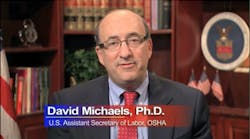After allegedly providing false documentation and making false representations claiming that hazards cited in October 2013 related to hydraulic presses had been corrected, Formed Fiber Technologies LLC has been issued 14 safety citations by OSHA, including willful and repeat citations, as well as a notice of failure to abate with proposed fines totaling $816,500 (the original penalty was $69,000). OSHA initiated the inspection as a follow-up inspection pursuant to its Severe Violators Enforcement Program.
The Sidney plant, which produces motor vehicle interior trimmings for automotive manufacturers, including Toyota and General Motors, was issued one failure to abate, nine willful and four repeat safety violations for continuously exposing employees to amputations and other hazards.
“Formed Fiber Technologies apparently decided that production was more important than ensuring its workers’ safety. They provided false abatement documentation to OSHA. They knew how hazardous these machines were without proper safeguards and also knew exactly how to fix those hazards,” said Assistant Secretary of Labor for Occupational Safety and Health Dr. David Michaels. “OSHA will not tolerate such blatant disregard for worker safety.”
OSHA’s January follow-up inspection found that abatement documentation Formed Fiber provided to OSHA in December 2013 was false and that employees had been exposed to unguarded machines and unsafe maintenance procedures well after the employer’s abatement claims. Failing to protect workers from dangerous machinery is among the most frequently cited OSHA violations and injuries involving this type of machinery often result in death or permanent disability.
“In the last month or so, OSHA has issued press releases related to citations issued to employers who have refused to respond to citations at all or who have simply not abated conditions for which citations had been issued in the past,” said attorney John Surma, special counsel in the Houston office of Adams and Reese. For the majority of his career, Surma has counseled clients with health and safety issues in the workplace. He helps employers deal with compliance issues and troubled safety programs, as well as catastrophic incidents involving both people and property. In addition to his OSHA practice, he also defends his clients in the litigation that ensues from catastrophic incidents. “In the case of Formed Fiber Technologies, not only is OSHA alleging that there was a failure to abate the cited conditions, but that documentation provided to OSHA was fraudulent and that misrepresentations were made.”
Surma noted that while few employers are ever subject to criminal prosecution for violations of the OSH Act, most criminal prosecutions that do occur arise out of misleading OSHA and/or providing OSHA fraudulent documentation. “In this case, I would not be surprised to see the US Attorney’s Office pursue a criminal prosecution of the person or persons involved in making such misrepresentations or in providing fraudulent documentation,” he added.
OSHA issued Formed Fiber Technologies nine willful citations for failing to prevent the start up of multiple hydraulic thermoforming presses, laminator machines and robot cells while workers were performing set-up, service and maintenance inside the machines. The company also allegedly failed to develop proper lockout/tag out procedures and encouraged workers to use unsafe methods to stop machines for maintenance. A willful violation is one committed with intentional, knowing or voluntary disregard for the law’s requirement, or plain indifference to employee safety and health.
Four repeat violations issued to the company involve allegedly failing to train workers on how to properly stop machines before service and maintenance, which continuously exposed machine operators to laceration, amputation, burns and having parts of the machine strike or crush them. The company allegedly failed to have identifying information on devices to indicate hazards.
A repeat violation exists when an employer has been previously cited for the same or a similar violation of a standard, regulation, rule or order at any facility in federal enforcement states within the last five years.
OSHA cited Formed Fiber Technologies in October 2013 for 11 violations, many involving the same standards. The company entered into a settlement agreement that included terms involving the abatement of hazards and paying a penalty of $69,000. Prior to October 2013, the company had been inspected by OSHA 16 times at their facilities nationwide, resulting in 80 violations being cited.
The company, based in Auburn, Maine, manufactures nonwoven fabrics and polyester staple fibers for the automotive industry. It employs 750 workers corporate wide, with 340 at the Sidney facility. Formed Fiber Technologies also operates Color-Fi Inc. in Sumter, S.C..
Formed Fiber Technologies has 15 business days from receipt of the citations and proposed penalties to comply, request an informal conference with OSHA’s area director or contest the findings before the independent Occupational Safety & Health Review Commission.

